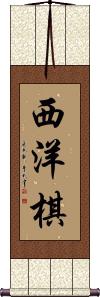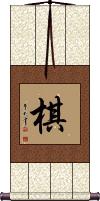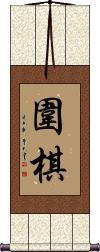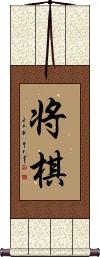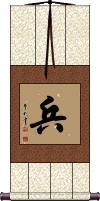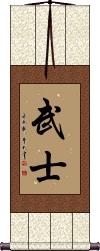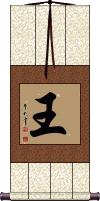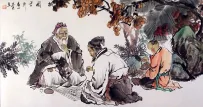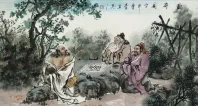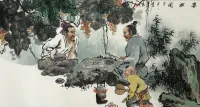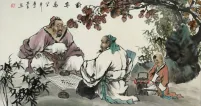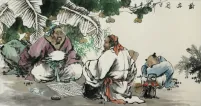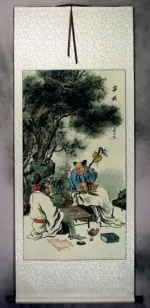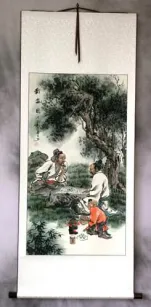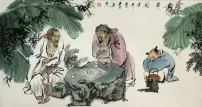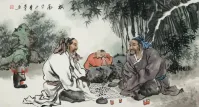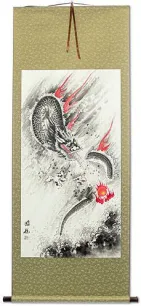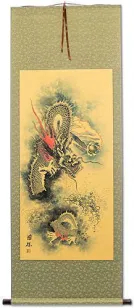Many custom options...
And formats...

Chinese Chess in Chinese...
Buy a Chinese Chess calligraphy wall scroll here!
Personalize your custom “Chinese Chess” project by clicking the button next to your favorite “Chinese Chess” title below...
Chess
Chess
棋 is the most simple or generic way to write “chess” in Asia.
棋 is part of other more specific words for board games of strategy such as the western version of chess, Chinese chess, Weiqi, or Go.
In Japanese, this single character is pronounced “Go” and often refers to the game known in the west as “Go” (not just the 5-in-a-row version but also the complicated encirclement game of strategy known in China as Weiqi).
In Chinese, this can be more ambiguous as to which game of chess you speak.
If you like any version of chess, or games of intense strategy, this can be the character to hang on the wall in your game room.
The Game of Weiqi / Weichi / Go
圍棋 is the Chinese title for the ancient game of strategy known as Weiqi or Wei Chi in Chinese and Go in Japanese.
![]() Note: In Japanese, this game is known by a different single Kanji as seen to the right. If you want this Japanese "Go" character, click the Kanji to the right instead of the button above.
Note: In Japanese, this game is known by a different single Kanji as seen to the right. If you want this Japanese "Go" character, click the Kanji to the right instead of the button above.
Shogi
Soldiers
兵 can be used to express soldiers, troops, a force, an army, weapons, arms, military, warfare, tactics, strategy, or warlike.
The final meaning depends on context. It's also part of the Chinese title for the Terracotta soldiers. In fact, this character is usually used in compound words (words of more than one character). Sometimes this single character is the title used for the pawns in a chess game (in a related issue, this is also a nickname for soldiers with the rank of Private).
Warrior
The first character, 武, is the spirit or essence of a warrior. The second character, 士, means soldier, officer, or official. 武士 is also used appropriately enough to describe a piece of a chess game. 武士 can also be translated as a soldier, cavalier, palace guard, or samurai, and sometimes as a knight. I've occasionally seen this translated as strong man or tough man (gender not necessarily implied).
By far, 武士 is the most common way to write warrior in Chinese characters, Japanese Kanji, and old Korean Hanja.
Note: In Japanese, this is Bushi, as in Bushido.
King
王 is wang which means king. It is not pronounced the way you think in Chinese. It is more like English speakers would want to pronounce wong. It has roughly the same vowel sound as tong, song, or long in English.
Note that this means king only, not the emperor. An emperor is higher than a king, and theoretically is chosen by God, according to ancient Chinese culture. However, the definition is often blurred at various points in Asian history.
王 can also be defined as ruler, sovereign, monarch, or magnate. It is also can refer to a game piece in the chess-like Japanese strategic game of shoji.
Note: This can also be a family name in Chinese, Korean and Vietnamese (in Vietnamese it's Vương).
See Also: Queen
This in-stock artwork might be what you are looking for, and ships right away...
Gallery Price: $200.00
Your Price: $88.88
Big Men Playing Weiqi (Asian Chess) Painting
Discounted Blemished
Gallery Price: $107.00
Your Price: $59.00
Gallery Price: $240.00
Your Price: $138.88
Gallery Price: $240.00
Your Price: $138.88
Not the results for chinese chess that you were looking for?
Below are some entries from our dictionary that may match your chinese chess search...
| Characters If shown, 2nd row is Simp. Chinese |
Pronunciation Romanization |
Simple Dictionary Definition |
馬 马 see styles |
mǎ ma3 ma me め |
More info & calligraphy: Horse(1) horse; (2) (See 競馬) horse racing; (3) (abbreviation) {shogi} (See 竜馬・2) promoted bishop; (4) {cards} knight (court card in mekuri karuta and unsun karuta); (surname) Me aśva, a horse; a stallion; one of the seven treasures of a sovereign. |
仕 see styles |
shì shi4 shih tsukou / tsuko つこう |
to serve as an official; an official; the two chess pieces in Chinese chess guarding the "general" or "king" 將|将[jiang4] official; civil service; (given name) Tsukou |
卒 see styles |
zú zu2 tsu sosu そす |
soldier; servant; to finish; to die; finally; at last; pawn in Chinese chess (1) (hist) low-ranking soldier; (n-suf,n) (2) (abbreviation) (See 卒業・1) graduation; (n-suf,n-pref) (3) (abbreviation) (See 卒業・2) moving on (from); outgrowing (something); (4) (abbreviation) (hist) (See 卒族) low-ranking samurai (1870-1872); (5) (abbreviation) (See 卒去) death (of a noble, etc.); (given name) Sosu suddenly |
帥 帅 see styles |
shuài shuai4 shuai tsukasa つかさ |
(bound form) commander-in-chief; (bound form) to lead; to command; handsome; graceful; dashing; elegant; (coll.) cool!; sweet!; (Chinese chess) general (on the red side, equivalent to a king in Western chess) (See 大宰府) director of the Dazaifu; (given name) Tsukasa |
車 车 see styles |
jū ju1 chü chiya ちや |
war chariot (archaic); rook (in Chinese chess); rook (in chess) (suffix) (1) car; vehicle; van; truck; wagon; lorry; (suf,ctr) (2) (train) car; carriage; (surname) Chiya A cart, wheeled conveyance. |
將帥 将帅 see styles |
jiàng shuài jiang4 shuai4 chiang shuai |
commander-in-chief, the equivalent of king in Chinese chess |
徐俊 see styles |
xú jun xu2 jun4 hsü chün |
Xu Jun (1962-), Chinese Chinese chess grandmaster |
棋具 see styles |
qí jù qi2 ju4 ch`i chü chi chü |
checkers (board and pieces for go 圍棋|围棋 or Chinese chess 象棋 etc) |
老將 老将 see styles |
lǎo jiàng lao3 jiang4 lao chiang |
lit. old general; commander-in-chief 將帥|将帅, the equivalent of king in Chinese chess; fig. old-timer; veteran See: 老将 |
象棋 see styles |
xiàng qí xiang4 qi2 hsiang ch`i hsiang chi shanchii / shanchi シャンチー |
Chinese chess; CL:副[fu4] (See 中国将棋) xiangqi (chi: xiàngqí); Chinese chess |
軍棋 军棋 see styles |
jun qí jun1 qi2 chün ch`i chün chi |
land battle chess, Chinese board game similar to Stratego |
四色牌 see styles |
suusoopai / susoopai スーソーパイ |
four-color cards (Chinese playing cards) (chi: sì sè pái); four-suited chess cards |
象棋賽 象棋赛 see styles |
xiàng qí sài xiang4 qi2 sai4 hsiang ch`i sai hsiang chi sai |
Chinese chess tournament |
中国将棋 see styles |
chuugokushougi / chugokushogi ちゅうごくしょうぎ |
Chinese chess; xiangqi |
中国象棋 see styles |
chuugokushougi / chugokushogi ちゅうごくしょうぎ |
Chinese chess; xiangqi |
捨車保帥 舍车保帅 see styles |
shě jū bǎo shuài she3 ju1 bao3 shuai4 she chü pao shuai |
rook sacrifice to save the king (in Chinese chess); fig. to protect a senior figure by blaming an underling; to pass the buck |
Variations: |
chuugokushougi / chugokushogi ちゅうごくしょうぎ |
Chinese chess; xiangqi |
The following table may be helpful for those studying Chinese or Japanese...
| Title | Characters | Romaji (Romanized Japanese) | Various forms of Romanized Chinese | |
| Chess | 西洋棋 | xī yáng qí xi1 yang2 qi2 xi yang qi xiyangqi | hsi yang ch`i hsiyangchi hsi yang chi |
|
| Chess | 棋 | go | qí / qi2 / qi | ch`i / chi |
| The Game of Weiqi Weichi Go | 圍棋 围棋 | wéi qí / wei2 qi2 / wei qi / weiqi | wei ch`i / weichi / wei chi | |
| Shogi | 将棋 | shou gi / shougi / sho gi | jiāng qí / jiang1 qi2 / jiang qi / jiangqi | chiang ch`i / chiangchi / chiang chi |
| Soldiers | 兵 | hei | bīng / bing1 / bing | ping |
| Warrior | 武士 | bu shi / bushi | wǔ shì / wu3 shi4 / wu shi / wushi | wu shih / wushih |
| King | 王 | ou / o | wáng / wang2 / wang | |
| In some entries above you will see that characters have different versions above and below a line. In these cases, the characters above the line are Traditional Chinese, while the ones below are Simplified Chinese. | ||||
Successful Chinese Character and Japanese Kanji calligraphy searches within the last few hours...
